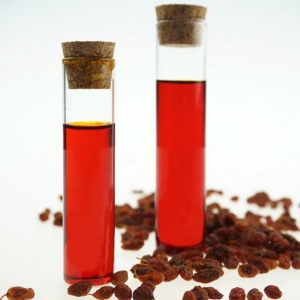Sea buckthorn oil is rich in a unique content of fatty acids. In particular, sea buckthorn oil contains rare palmitooleic acid (omega-7) which is a component of skin lipids and stimulates regenerative processes in the wound and epidermis healing. Seabuckthorn oil activates physiological skin functions and reduces scars.
Used orally sea buckthorn oil supports treatment of gastric, duodenal and intestine ulcers, while applied topically its soothes and reduces skin burns, chafed skin, bedsores and trophic skin changes.
Additionally, sea buckthorn oil contains saturated fatty acids in the form of palmitic acid and stearic acid, and it has a wide range of essential unsaturated fatty acids (UFA), in particular PUFA (polyunsaturated fatty acids). They include alpha-linolenic acid, gamma-linolenic acid, linolic acid, oleic acid and eicosanoic acid.
GLA is a very important ingredient for skin, because as a building material for components of intercellular cement it binds epidermis cells. It is also a component of phospholipids which build cell membranes.
Gamma-linolenic acid improves blood circulation which positively affects the supply of nourishment and oxygen to skin, and it removes excess toxins which as a result improves skin structure, appearance and tone. GLA in sea-buckthorn oil easily penetrates to deeper skin layers where it is converted to prostaglandins.
Therefore, GLA effectively protects skin against infections, counteracts allergies, relieves inflammations and slows down the ageing process.
Moreover, skin deprived of this rare linolic acid becomes drier, less elastic and susceptible to any lesions. The presence of linolic acid, which is a component of intercellular cement, results in stimulation of cellular regeneration and regulates the functions of skin sebaceous glands.
On the other hand, a high content of saturated fatty acids causes sea buckthorn oil to soften the epidermis and protect and secure it against transepidermal water loss.
Saturated fatty acids
Sea buckthorn oil contains palmitic and stearic acids, which form a protective occlusion on the skin which strengthens the effect of a protective barrier. They provide appropriate turgor and firmness of skin, and have smoothing and softening properties.
Unsaturated fatty acids
Sea buckthorn oil contains linolic acid and alpha-linolenic acid which cannot be produced by a human body due to a lack of certain enzymes. Other polyunsaturated acids found in sea buckthorn oil include gamma-linolenic acid, oleic acid and palmitoleic acids, which can be produced by the body. Linolic acid is considered to be the most important of all omega-6 acids as other acids in this group. ALA or GLA can be obtained from it.
Complex lipids
Sea buckthorn oil also contains the complex lipids which include:
phospholipids and glycolipids that exhibit skin moisturizing and soften the epidermis, improve elasticity of the skin, reduce inflammation of the skin, accelerate skin regeneration and cell renewal. Lecithin, belonging to the group of phospholipids, has skin renewing and moisturizing properties.
Sterols, which can strengthen the lipid barrier of the skin, protects from harmful substances of external origin and reduces the excessive water loss through the epidermis, thereby improving the skin elasticity and firmness.
Other bioactive compounds
Sea buckthorn oil contains many active substances, through which this oil has many different properties. In particular vitamins A, C, E, F, P and B complex are present in the oil. Vitamin A, found in the form of carotenoids, provides regenerative and anti-wrinkle properties of the oil. Vitamin C, the content of which is 15 times higher than in orange fruit, has an antioxidative effect and protects against harmful UVA and UVB radiation. It also evens out the skin tone. The presence of tocopherols and minerals and flavonoids strengthens the walls of capillary blood vessels.
Sea buckthorn oil also contains sterols, fruit acids, phenolic compounds, tannins, phospholipids, anthocyanins, sugars, pectins and mineral salts including sulfur, selenium, copper and zinc. The importance for human health of sea buckthorn oil have been proved by in vivo tests.

Leave A Comment